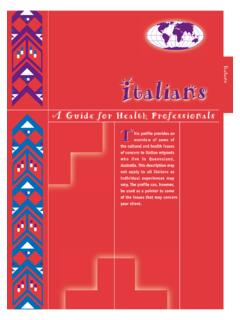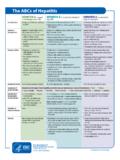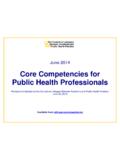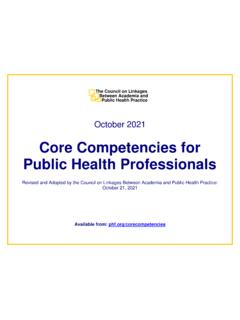Transcription of Ethical Guidelines for Health Professionals
1 0 Ethical Guidelines FOR Health Professionals 2010 1 INDEX 1. GENERAL Ethical Section One: Ethics .. Section Two: General Ethical duties .. 2. Guidelines FOR MAKING professional SERVICES 3. POLICY STATEMENT PERTAINING TO PERVERSE INCENTIVES AND RELATED MATTERS FOR 4. Guidelines FOR THE MANAGEMENT OF PATIENTS WITH HIV INFECTION OR 5. Guidelines FOR CANVASSING PATIENTS FROM 6. Guidelines FOR PROTECTING THE RIGHTS AND CONFIDENTIALITY OF 42 7. CONFIDENTIALITY ..45 8. Guidelines ON KEEPING OF PATIENT 58 2 1. professional Guidelines THE SPIRIT OF professional Guidelines Health professions are based on a relationship of trust with patients.
2 The term profession means a dedication, promise or commitment publicly made .1 To be a Health professional requires a life-long commitment to good professional and Ethical practices and unreserved dedication to the good of fellow human beings and society. In essence, the practice of Health professions is a moral enterprise. In this spirit, the Health Professions Councils of Namibia (HPCNA) presents the following Ethical Guidelines : 1. GENERAL Ethical Guidelines Being registered as a Health professional with the HPCNA confers on us the right and privilege to practice our professions. Correspondingly, Health Professionals have moral or Ethical duties to others and society.
3 This part contains general Ethical Guidelines for and general duties of Health Professionals . Such Guidelines are inspirational and value-oriented, expressing the most honourable ideals to which members of a profession should aspire. By contrast, specific or compliance-based Ethical Guidelines are more specific rules or duties derived from those general Ethical Guidelines and duties. They offer more precise guidance and direction for action in concrete situations. They also make it easier to implement sanctions against transgressors. It is impossible, however, to develop a complete set of specific Ethical prescriptions applicable to all conceivable real-life situations.
4 In concrete cases, Health Professionals may have to work out for themselves what course of action can best be defended ethically. This requires Ethical reasoning. This Annexure has two sections: Section One lists thirteen core Ethical values and standards that underlie professional and Ethical practice, and gives a short explanation of how one makes practical decisions through Ethical reasoning. Section Two explains what a duty is, and catalogues the general Ethical duties of Health Professionals . 1 Pellegrino, ED. Medical professionalism: Can it, should it survive?
5 J Am Board FAM Pract 2000; 13(2):147-149 (quotation on p. 148). 3 SECTION ONE - ETHICS 1. CORE Ethical VALUES AND STANDARDS FOR GOOD PRACTICE Everything ethically required of a professional to maintain good professional practice is grounded in core Ethical and professional values (in boldface below) and standards (the directives following the core values). Although these core values and standards may be presented as a hierarchy (for example, autonomy and confidentiality may be classified under respect for persons), it is presented as a linear list for the sake of simplicity. In concrete cases, the demands of these core values and standards may clash, thus making competing demands on Health Professionals .
6 The only way to address such clashes is through Ethical reasoning. Respect for persons: Respect patients as persons, and acknowledge their intrinsic equal worth, dignity and sense of value. Best interest or well-being: Non-maleficence: Do not harm or act against the best interests of patients, even when they conflict with the Health professional s own interest. Best interest or well-being: Beneficence: Act in the best interests of patients even when there are conflicts with the Health professional s own interest. Human rights: Recognise that some interests of individuals may be so important that they acquire the status of human rights in the form of either claims or freedoms to be respected by all.
7 Autonomy: Honour patients right to self-determination or to make their own informed choices, living their lives by their own beliefs, values and preferences. Integrity: Incorporate core Ethical values and standards as the foundation for good and upright character and responsible practice. Truthfulness: In professional relationships with patients, regard the truth and truthfulness as the basis of trust. Confidentiality: In professional relationships with patients, treat personal or private information as confidential, unless overriding reasons confer a moral right to disclosure. Compassion: Be sensitive to and empathise with individual and social needs for comfort and support, and seek and create opportunities to translate emotions, such as feelings of sympathy or empathy into action.
8 Tolerance: Respect the right of people to have different Ethical beliefs as these may arise from deeply held personal, religious or cultural convictions. Justice: Treat all individuals and groups in an impartial, fair and just manner. professional competence and self-improvement: Continually endeavour to attain the highest level of knowledge and skill required within the Health professional s area of practice. 4 Society: Consistent with his or her professional abilities and standing in the society, a Health professional should strive to contribute to the betterment of society. Privacy and the protection thereof.
9 2. Ethical REASONING The core values and standards referred to above are the foundations that ground the general or inspirational Ethical Guidelines . Being general, such Guidelines can be applied to many different concrete cases. But how does one proceed from these Guidelines to making practical decisions or choices? How does a guideline apply in a specific case and how do we handle difficult cases where two (or more) Guidelines prescribe contradictory solutions? Briefly, what is needed is Ethical reasoning. Roughly speaking, such practical reasoning proceeds in four steps: The problem: Formulate the problem.
10 Is there a better way of understanding it? Information: Gather all the relevant data (clinical, personal, social, etc.). Options: Consider all reasonable options, choices or actions under the circumstances. Moral assessment: Weigh the Ethical content of each option by asking the following: What are the likely consequences of each option? What are the most important values, duties and rights of the client/patient and his/her family and social group, and which weighs the heaviest? What are the weaknesses of your view? How would you want to be treated in the circumstances of the case?









